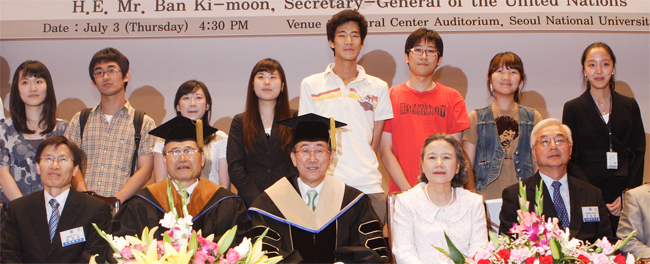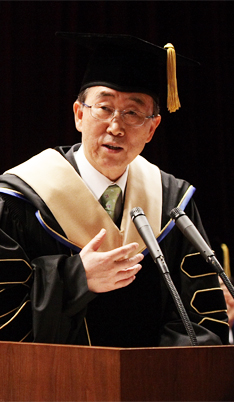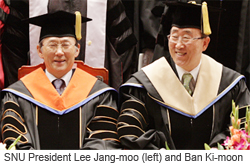
SNU awarded Honorary Doctorate Degree to UN Secretary-General Ban Ki-moon on July 3, 2008. Receiving the degree, Ban gave a speech to SNU students and faculty. He urged students of SNU to help others follow the path of Korea to prosperity, democracy, and respect for human rights.
Ban was born on 13 June 1944. He received a bachelor's degree in international relations from Seoul National University in 1970, and a master's degree in public administration from the Kennedy School of Government at Harvard University in 1985.
Ban was the Minister of Foreign Affairs and Trade of the Republic of Korea from January 2004 to November 2006. His tenure included postings in New Delhi, Washington D.C. and Vienna, while he was responsible for a variety of portfolios such as Foreign Policy Advisor to the President, Chief National Security Advisor to the President, Deputy Minister for Policy Planning and Director-General of American Affairs.
This is the full text of Ban's address at Seoul National University. Professor Lee Jang-moo, President of Seoul National University,
Professor Lee Jang-moo, President of Seoul National University,
Distinguished faculty,
My dear young students,
Ladies and Gentleman,
I am honoured and moved beyond words to be recognized by my revered alma mater today. I owe this institution so much already. In the 38 years since I graduated, I have felt an enormous debt of gratitude to SNU for the way it prepared me for what was to come.
The path to my doctorate today meandered longer than that of the most laggardly graduate student. And standing before all of you, I confess I feel a little embarrassed to receive something that has not been earned by means of true scholarship -- especially since our Korean culture puts great stock in earning one’s way through hard work and perseverance. But don’t worry, President Lee Jang-moo, I would never give this back. Any doctorate from Seoul National University is to be cherished and valued.
I thought it would be appropriate, therefore, to speak today about the two paths of scholarship and of public service, and of how they converge in the world of opportunity and risk that stands before us. We live in an era of accelerating change.
From my childhood in a Korea devastated by war, poverty and famine, I have witnessed a transformation on a scale unimaginable when I was a young boy. Even dreamers could not have projected such a profound metamorphosis of our land and our nation. Today, we honour your parents and grandparents for all that they have done to bring about this new Korea.
The pace of change will be even more rapid during the lifetime of those of you who are students here today. Your generation will produce more dramatic technological, social, economic, and political advances than any before it. You will be known as the `change generation`. You may not be able to change everything, but you can and must determine its direction.
Of all the natural species, it is humans who have been granted the role of the agent, not just the subject, of change. This is our sacred and profound responsibility, individually and collectively. We have not, unfortunately, always acquitted our stewardship of the Earth we share with the judgment, foresight, and integrity this grave responsibility entails. By and large, we have created our problems, even as we have the means and the intellect to resolve them peacefully and progressively.
As leaders of tomorrow, you should embrace change, not fear it. By changing ourselves, we change the world.
By changing the world, we change our destiny. That is the lesson of Korea's past; it will be the text of our future as well. No country has worked harder for or benefited more from change than South Korea. Now it is our duty to help others follow our path to prosperity, democracy, and respect for human rights.
By serving others, we serve ourselves, as Korea`s future is tied to the world`s future. Our fates are inseparable. We Koreans can, and must, play a larger role in addressing the pressing challenges on the global agenda.
This is especially true to of all of you as students of SNU. Our great university is helping to transform our country and, with time, our peninsula and our world. It is becoming a global, not just national, research university as ideas move over the internet without regard to time and space, much less to national borders, politics, or culture.
Your leadership has never been more important, for the ties that bind our common humanity together are fraying.
They are being severely tested by four challenges that will shape the world's future.
First, uncontrolled climate change and environmental degradation are already ravaging our weather, our economies, and our daily lives. The effects may be pervasive, but they are not yet irreversible. They pose hard policy choices domestically as well as internationally; and they demand the kinds of global trade-offs and sustained negotiations that I have been encouraging through the United Nations.
Second, population and economic growth have put an unprecedented strain on the Earth's finite resources.
Today, we are facing a dire combination of food, water, and energy shortages. For the wealthy, this may take the form of inconvenient price rises. But for the billions of impoverished, such scarcities have life and death implications. With far-sighted conservation, a collaborative spirit, and wise policy choices, we can manage the effects of these scarcities, but again it will require new dimension of cooperation on a global and regional basis, as these shortages also transcend borders and ideologies.
Third, the struggle against inequality, intolerance, and injustice continues. In too many countries, human rights remain more of an aspiration than a practice. Too often, national leaders seek to hide abuses of fundamental human rights and humanitarian norms behind the false cloak of sovereignty.
Despite the solemn pledges of the 2005 World Summit, some still seek to frustrate my efforts to give institutional and policy life to the principle of the responsibility to protect. Sovereignty demands the protection of populations as the highest calling of the state. To deny this core responsibility is to deny the very rationale and purpose of state sovereignty.
Fourth, thanks in part to the work of the United Nations and its regional and sub-regional partners, the incidence of inter-state conflict has eased markedly since the end of the Cold War. But in its place, a worrying cluster of stubborn and inter-related transnational security threats has emerged. Among these are the proliferation of weapons of mass destruction, the pervasive presence of small arms and light weapons, the tragedy of failing states, the corrosive effects of transnational organized crime, and the indiscriminate cruelty of terrorism.
These can only be addressed through persistent and sophisticated collaboration on the local, national, regional, and global levels. We cannot let these threats define our future, shape our lives, or compromise our values.
We must prevail, even as we preserve our laws, our principles, and our respect for diversity and for other cultures and religions.
Dear friends,
Do not be intimidated by this roster. Each challenge is the product of human choices, of mistaken priorities,
of inadequate institutions and laws. Each can be resolved through individual and collective action,
through the innovative ideas and fresh energies that will characterize your generation of problem solvers.
We can renew the ties that bind, asserting our common interests, our common ideals, our common humanity.
You can, and will, make a difference.The world awaits you.
Thank you and good luck.
UN Secretary-General, Ban Ki-moon
July 3, 2008
SNU NOW
News
News
Address by UN Secretary-General Ban Ki-moon on Receiving an Honorary Doctorate Degree from Seoul National University
Jul 04, 2008

